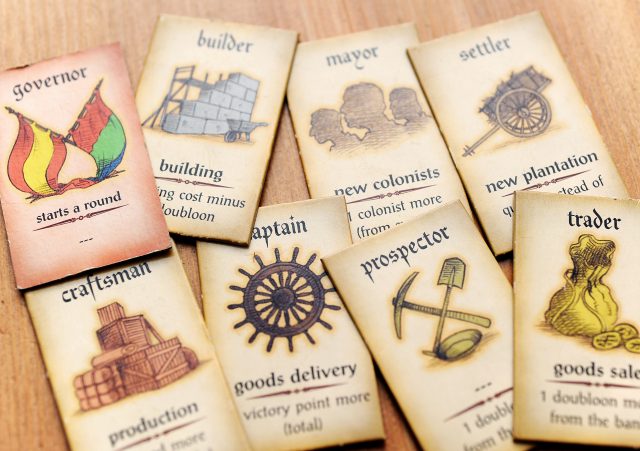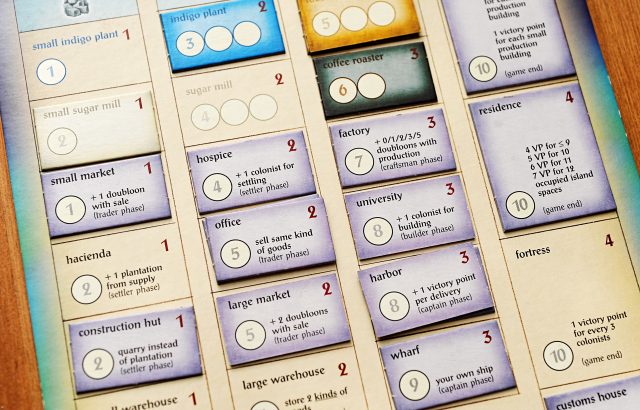Since Sean and Nicole will be sharing all the delicious newness they got to play at this year’s Gathering of Friends ((insert overt hint for an invite next year here)), I thought I’d continue my “you really should try” series (the first was back at the beginning of March) with Andreas Seyfarth’s Puerto Rico. We have here a game that sits at #11 on BGG’s overall rankings after fifteen years. You have to go down to 1995’s El Grande, at #49, to find an older game than that.
 What makes Puerto Rico a game still worth playing? For people who have just entered the tabletop hobby through games like Catan or Ticket to Ride, there is just the right amount of added complexity in Puerto Rico to engage you without being overwhelmed.
What makes Puerto Rico a game still worth playing? For people who have just entered the tabletop hobby through games like Catan or Ticket to Ride, there is just the right amount of added complexity in Puerto Rico to engage you without being overwhelmed.
Players represent plantation owners who are trying to amass the most…victory…through the accumulation of so-called “victory points”. You earn points by shipping goods and constructing buildings.
The two centrepieces to Puerto Rico’s design are the buildings and what BGG called “variable phase order”—but what I would call role selection. The first modern game to use this mechanic was 2000’s Citadels, also still going strong, but it was Puerto Rico that really put role selection on the map.
Every round starts with a set number of “role tiles” available in the middle of the table, each representing a different job on the island and corresponding action:
 the Craftsman activates plantations to produce barrels of goods;
the Craftsman activates plantations to produce barrels of goods;On your turn you claim one of the role tiles and do its action—plus a little bonus (choosing the tradesman gets you a little extra money for your goods, choosing the captain gets an extra VP for shipping your goods, and so on). Going clockwise, the other players may follow along and do your action, but only you get the bonus. Once completed, the role is no longer available that round—which is a bugger if you were hoping to produce first and then ship but the players before you in turn order have different ideas.
One little fillip which countless games have copied since is that one gold piece is put on every unchosen role tile at the end of each round, before everything is reset; these rewards stack from round to round, so eventually it becomes worth choosing a role just for its gold. I remember reading an interview with Seyfarth where he said this was added late in the design process to correct for the fact that certain roles become less useful as the game goes on. It was a simple yet genius choice, making every role choice viable through the entire game.
Aside from role selection, the other major design element in Puerto Rico  is the choice of buildings. Some are necessary to produce goods—you can’t actually make a barrel of sugar, for instance, unless you have a sugar plantation and a sugar factory (each of which needs a colonist on it to activate). Others give you bonuses when you trade or ship goods, or let you bend or break one of the game’s rules. The most expensive buildings do nothing during the game but give you mucho bonus VP at the end of the game.
is the choice of buildings. Some are necessary to produce goods—you can’t actually make a barrel of sugar, for instance, unless you have a sugar plantation and a sugar factory (each of which needs a colonist on it to activate). Others give you bonuses when you trade or ship goods, or let you bend or break one of the game’s rules. The most expensive buildings do nothing during the game but give you mucho bonus VP at the end of the game.
Between them, the roles and the buildings do represent a step up, learning-curve-wise, from gateway games. It is also a lot less luck-based than most gateway games; in fact, the only randomness in the game comes from (a) seating order and (b) the plantations that become available in each settler phase. That is it—no card draws, no die rolls, no fing-fong-fooey. Thus, playing Puerto Rico for the first time can feel overwhelming, with no obvious “best” choice or path to victory, and your first couple of games will take a long time as you learn the roles and building choices. Rest assured, though, that once you’ve got these down games can take as little as ninety minutes, even with five players.
 The game has been around for fifteen years, so various strategies have arisen and evolved over time—almost none of which I’m going to share with you, because spoiler alert, and because I believe in people finding these things out for themselves. The two morsels I will share are:
The game has been around for fifteen years, so various strategies have arisen and evolved over time—almost none of which I’m going to share with you, because spoiler alert, and because I believe in people finding these things out for themselves. The two morsels I will share are:
The two major faults of the game are the tyranny of seating order and the lack of variety in buildings. If you are sitting to the left of an experienced player, prepare to be screwed every round, and vice versa. And because all buildings are available every game, play can become overly scripted with experienced players. The latter problem, at least, can be solved by using the expansion (not too hard to find) which introduces a large number of alternate buildings which you can swap in, which definitely messes with established strategies.
Puerto Rico is still crouched outside BGG’s Top Ten for a reason. If you haven’t played it yet, you really should. And if you haven’t played in a while, or haven’t played with the building expansion, why don’t you crack it open? You will find it as reassuring and comfy as putting on a beloved old sweater.
[…] been a few weeks since I last recommended an oldie but goodie, and yesterday’s British election had me thinking about a game I haven’t […]